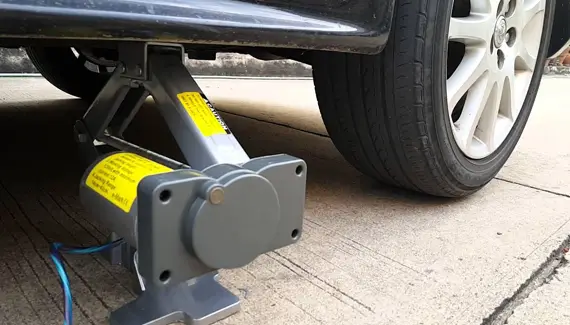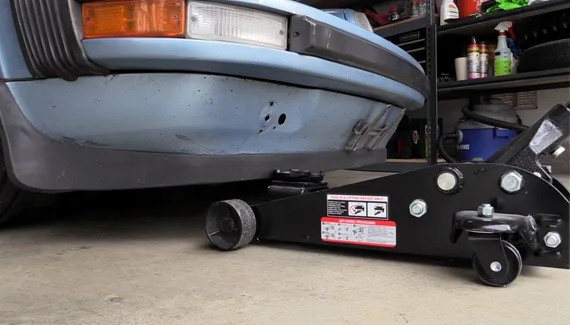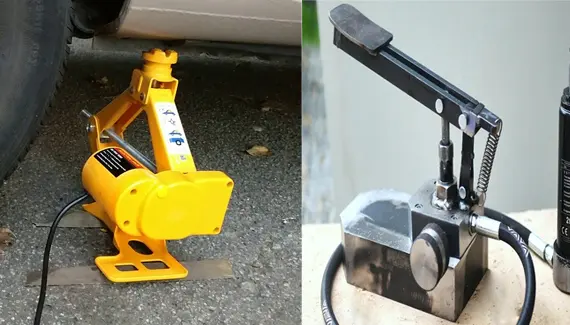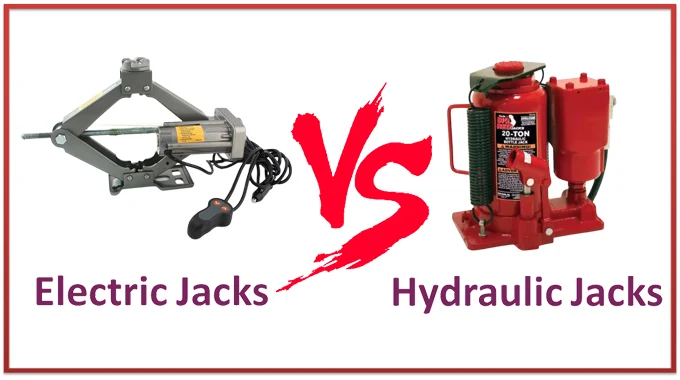Last Updated on March 2, 2023
Car jacks are familiar to anyone who’s ever had a flat tire, but when it comes to choosing one, there are two main types: Electric and Hydraulic car jacks. Although they both provide the good lifting power necessary to lift a car, there is a massive difference between them in their operating process.
Batteries power electric jacks, so they’re easy to use and don’t require extensive manual labor. Conversely, hydraulic jacks are powered by fluid pressure, so manual pumping is required to operate them, which can be tiring if used repeatedly.
Below, we will discuss in-depth information on the differences between electric and hydraulic jacks in terms of their operating process, lifting power, lifting capacity, and more. So why wait? Let’s explore the differences.
Deciding Electric or Hydraulic Car Jacks: Find out the Differences Between Them

Here is a look at the key factors to consider when deciding between electric and hydraulic car jacks.
Operating Power:
Electric car jacks are powered by your car’s battery, which means they’re convenient. Simply attach the jack to your cigarette lighter, then raise or lower it by pressing a button.
The problem is, electric jacks can only be used when your car’s engine is running, which means they’re not ideal for changing tires in an emergency situation.
Hydraulic car jacks, conversely, use fluid power to raise and lower the jack. This means they don’t require an external power source, which makes them ideal for emergency situations. In contrast, hydraulic car jacks can be more difficult to use than electric jacks. You’ll need to pump the handle of the jack up and down in order to raise or lower it.
Weight:
When it comes to weight, electric jacks typically have an advantage over hydraulic jacks. This is because electric jacks are powered by a motor, which does the heavy lifting for you. On the other hand, hydraulic jacks rely on your own strength to generate the power needed to lift the load.
Despite this, hydraulic jacks can often be more powerful, so they can be better suited for lifting very heavy loads. Ultimately, the best type of jack for you will depend on your specific needs and preferences.
Lifting Power:
Hydraulic jacks are operated by pumping a handle up and down, which forces fluid into a cylinder and raises the jack. Electric jacks, meanwhile, are powered by a motor and require the user to simply press a button.
In terms of raw lifting power, hydraulic jacks have the advantage. Then again, electric jacks are much easier to operate since all you need to do is push a button.
Lifting Capacity:
When it comes to lifting capacity, hydraulic jacks are more powerful than electric jacks and can lift heavier vehicles. This is because hydraulic jacks use fluid pressure to generate lifting force, while electric jacks rely on electricity to operate a motor that powers the jack.
Also, hydraulic jacks are more stable than electric jacks and are less likely to tip over. Electric jacks also have a shorter lifting range than hydraulic jacks. For these reasons, hydraulic jacks are the preferred choice for lifting heavy vehicles.
Heat Dissipation:
Overheating is a common problem with electric jacks, as the motor can quickly reach high temperatures. This can cause damage to the jack and may even lead to a fire. Hydraulic jacks are less likely to overheat due to their design.
The fluid used in hydraulic jacks helps to dissipate heat, meaning that the jack can be used for extended periods of time without damaging it.
Also, hydraulic jacks are generally more durable than electric jacks, as they are not susceptible to deterioration in the same way. Therefore, they can be a better choice for people who need to use a jack frequently.
Maintenance:
Another key difference between hydraulic and electric jacks is their cost. Hydraulic jacks are more expensive than electric jacks, and they also require regular maintenance in order to keep them in good working condition.
Electric jacks are less expensive upfront and require less maintenance over time, making them a more cost-effective choice for many users.
Portability:
When it comes to electric vs hydraulic jacks, one of the main differences is portability. Electric jacks tend to be smaller and more lightweight than hydraulic jacks. This makes them more portable and easier to store in a small space.
If you’re looking for a jack to take on the road with you, an electric jack is the way to go. In contrast, if you need a jack for use in your garage or workshop, a hydraulic jack may be more suitable.
Hydraulic jacks are also more powerful than electric jacks, so if you need to lift heavy objects, a hydraulic jack is a better option.
User-friendliness:
Electric jacks are operated with remote control, which can be handy when jacking up a vehicle on your own. In any case, they require batteries to operate, so you’ll need to make sure you have fresh batteries on hand before using one.
Hydraulic jacks, meanwhile, need to be operated manually. This can be harder if you’re trying to jack up a vehicle by yourself, but it does mean that you don’t need batteries to use a hydraulic jack.
What are the Benefits of Using an Electric Jack?

There are many benefits to using an electric jack. Perhaps the most obvious benefit is that it requires much less effort to use than a manual jack. Simply plug the jack into a power outlet and press a button to raise or lower the vehicle.
This can be a lifesaver if you have a flat tire in a remote location or if you are trying to change a tire on a steep hill. Also, electric jacks are typically faster than manual jacks, so you can get back on the road more quickly.
Also, electric jacks are less likely to break down compared to manual jacks, so you can trust that they will be there when you need them.
What are the Benefits of Using a Hydraulic Jack?
Hydraulic jacks are extremely useful tools that can make a wide variety of tasks much easier. They work by using hydraulic fluid to exert force on a piston, which in turn raises or lowers whatever the jack is attached to.
This can be extremely helpful when trying to lift heavy objects, as it takes advantage of the laws of physics to provide a mechanical advantage. Apart from that, hydraulic jacks are often used in situations where accuracy is key, such as when lifting a vehicle so that its tires can be changed.
The smooth and consistent operation of a hydraulic jack makes it much easier to achieve the desired results. Overall, hydraulic jacks are versatile and user-friendly tools that can make many tasks simpler and more efficient.
What are the Disadvantages of Using an Electric Jack?
While an electric jack may be easier to operate than a manual jack, there are several disadvantages that should be considered before making a purchase. First, electric jacks require a reliable power source.
If you are stranded in a remote location without access to an outlet, your electric jack will be useless. Also, electric jacks tend to be more expensive than manual jacks.
Also, electric jacks are more likely to fail than manual jacks. If the motor burns out or the electronics malfunction, you will be left with a heavy piece of machinery that is impossible to lift. For these reasons, many people prefer to stick with a manual jack.
What are the Disadvantages of Using a Hydraulic Jack?

A hydraulic jack is a great tool to have on hand for lifting heavy objects. Despite this, there are some disadvantages to using this type of jack. First, hydraulic jacks rely on a fluid to generate their lifting power.
This means that they can be susceptible to leaks. If the fluid leaks out, the jack will no longer be able to lift anything. Second, hydraulic jacks require a certain amount of maintenance. The fluid needs to be changed regularly, and the seals need to be inspected for signs of degradation.
Third, hydraulic jacks are not always as stable as other types of jacks. This can be an issue when lifting very heavy objects.
Last but not the least, hydraulic jacks can be quite expensive. If you are only going to use it occasionally, it may be more cost-effective to rent or borrow one rather than purchase your own.
Is hydraulic power more common than electric power in car jacks?

Many people think that all car jacks use hydraulic power, but this is not actually the case. Hydraulic jacks are the more traditional type of jack, and they use fluid pressure to lift the vehicle.
They’re very durable and can be used for heavy-duty applications, but they can be difficult to operate. While hydraulic jacks are very common, there are also a number of electric jacks on the market.
These jacks work by using a motor to lift the vehicle, and they can be very effective. But they do have some drawbacks. Electric jacks are usually more expensive than hydraulic jacks, and they can be less powerful. They’re much easier to use than hydraulic jacks, but they’re not as durable.
Can Electric and Hydraulic Jacks be Used Interchangeably in All Applications?
Electric and hydraulic jacks can be used interchangeably in some applications as long as they have the same lifting capacity. Electric jacks are more portable and offer quicker lift times than hydraulic ones.
Hydraulic jacks are generally more powerful than electric ones and typically require less effort but do not offer as much portability or speed as their electric counterparts. No matter which type of jack you choose for your application, make sure it has the necessary lifting capacity for the job.
By doing this, users can safely benefit from the interchangeable nature of electric and hydraulic jacks without risking personal injury or damage to property.
What Type of Pump is Used in a Hydraulic Jack?
The key component of a hydraulic jack is the pump, which generates the fluid pressure necessary to lift the load. Generally, there are two kinds of pumps used in hydraulic jacks: hand pumps and foot pumps.
Hand pumps are operated by manual power, typically through a handle or lever. The operator must generate the necessary pressure to raise the load, which can be difficult for heavy loads.
Foot pumps, in contrast, use the weight of the operator’s body to generate the necessary pressure. The operator stands on a pedal, which activates the pump and generates the fluid pressure. This type of pump is more effective for heavier loads, as the weight of the operator provides the extra force.
Is there any task that requires an electric car jack specifically?

The main benefit of using an electric car jack is that it helps to reduce the risk of injury. When lifting heavy objects, there is always the potential for something to go wrong. If you are not strong enough to lift the object, you could end up dropping it on yourself or someone else.
With an electric car jack, you can avoid this danger completely. Electric car jacks are typically much faster than their manual counterparts. If you are in a hurry and need to get your wheels changed quickly, an electric car jack can be a lifesaver.
Electric or Hydraulic Car Jacks: Which One Is Right for You?
Hydraulic and electric car jacks are useful for lifting heavy loads quickly and efficiently. While each offers its advantages and disadvantages based on the task at hand, it’s essential to understand what makes them unique so that you can choose the right one for your needs.
Electric jacks are relatively easy to use and require minimal maintenance but lack power and capacity compared to hydraulic jacks, which provide more energy and are easier to maintain but require greater expertise during operation.
We hope that this comprehensive comparison between electric and hydraulic jacks has given you better clarity on the better choice for your next project. Considering all the above factors and your specific requirements, you can easily choose the best suited for your project needs.
